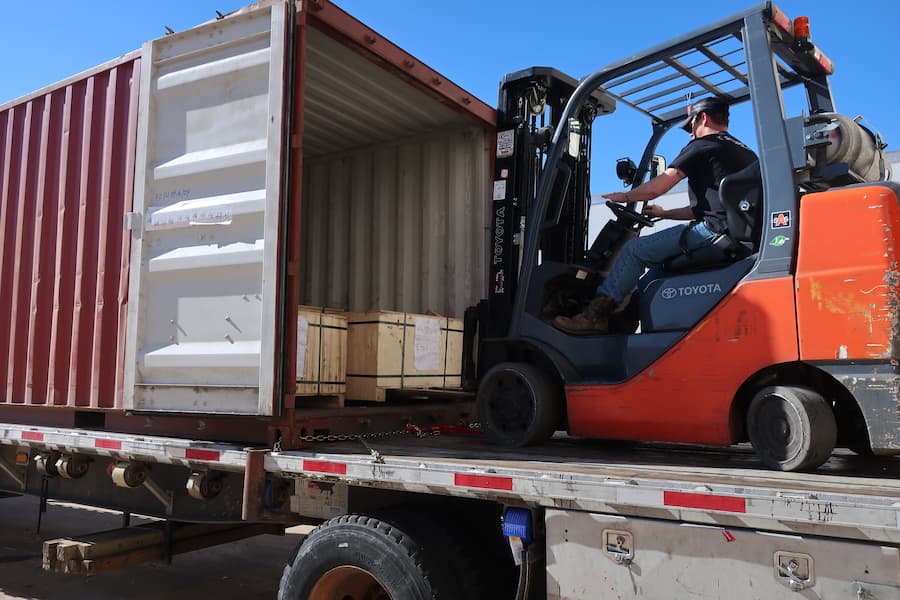It’s no joke: Starting on April Fool’s Day (April 1, 2018), the Federal Motor Carrier Safety Administration (FMCSA) started taking a bite out of commercial truckers driving without electronic logging devices (ELDs).
ELD Rule Basics
Though used in the trucking industry for nearly 20 years, ELDs became law in 2012 after Congress passed a bill requiring the FMCSA to create a mandate for installing them in all American commercial trucks. Though the mandate took effect on December 18, 2017, the FMCSA granted an initial “soft period” of compliance; Truckers who drove without an e-logging device received violations but didn’t have points recorded against them in the Compliance, Safety, Accountability (CSA) carrier scoring system. That “introductory period” ends March 31. Drivers who violate the ELD mandate will begin accruing points (and fines) on April 1, 2018.
According to the FMCSA, the new ELD rules apply to “most motor carriers and drivers who are currently required to maintain records of duty status (RODS).” There are some exemptions:
- Drivers who use paper RODS for not more than eight days out of every 30-day period.
- Drivers of vehicles manufactured before 2000.
- Drivers who are required to keep RODS not more than eight days within any 30-day period.
- Drivers who conduct drive-away-tow-away operations, where the vehicle being driven is the commodity being delivered, or the vehicle being transported is a motorhome or a recreation vehicle trailer with one or more sets of wheels on the surface of the roadway.
- Drivers who fit all criteria of the 100-air-mile radius [short haul] exception.
- Drivers using vehicles already equipped with Automatic On-Board Recording Devices (AOBRDs), but only until Dec. 17, 2019.
The new regulations require ELD use (except where exempted); set performance and design standards for ELDs; require ELDs to be certi
fied and registered with FMCSA, establish what supporting documents are required, and prohibit ELD-related harassment of drivers.
There’s another, less obvious but very important change in the new guidelines. Though carriers’ admin offices will be able to review log data and suggest changes, they no longer are the final reviewers; that responsibility lies with the drivers.
Violations, Fines, and Repeat Offenders
As of April 1, drivers who are required to have ELDs and are caught driving without them will be placed out of service for 10 hours in accordance with Commercial Vehicle Safety Alliance criteria. “Once that 10-hour period is up, assuming the driver has at least a paper log, we’re going to provide flexibility for that driver to proceed to their final destination and deliver their load,” said Joe DeLorenzo, FMCSA’s head of compliance and enforcement, adding that drivers must “be compliant with the ELD rule before being dispatched on their next trip.”
Drivers who are cited for non-compliance not only face being ruled out-of-service but will have points recorded against them in their CSA scores. In addition, drivers (and fleets) may face fines for Hours of Service (HOS) violations—ranging from $1,000 to $10,000 for each offense. The penalty is assessed like any other non-compliance traffic offense, by the level of intent in not complying, by responsibility in the particular violation, and by determining whether the driver or carrier is a repeat offender.
The FMCSA is on the lookout for those repeat offenders—fleets with more than one occurrence of the same violation in at least 10% of their records. Those carriers will be fined and see their safety rating drop. Especially important to note: violations that occurred in the transition period (Dec.18, 2017–April 1, 2018) will be counted. “If FMCSA sees we’re seeing persistent violations by a major carrier taking advantage, they could be subject to an investigation and penalties,” DeLorenzo said.
Return to Duty and a Reprieve for Ag Haulers
In a March 13 media update, DeLorenzo summarized the return-to-duty status procedures as simply being compliant with the ELD rule before driving again. He spoke more about the FMCSA’s 90-day temporary waiver of the rule to carriers of agricultural commodities and livestock. “We are mindful of the unique work our agriculture community does,” he said, “and will use the following 90 days to ensure we publish more helpful guidance that all operators will benefit from.”
The FMCSA has issued an Hours of Service and Agricultural Exemptions Fact Sheet, but it’s also worth noting that carriers using the exemption must either have a “satisfactory” FMCSA safety rating or be unrated. Their drivers must also carry a copy of the waiver notice, and report any accidents to FMCSA within five days of the incident.
The Value
When it comes to change, there will always be naysayers, people who don’t believe that new ideas—especially new regulations like the ELD rule—can be a good thing. But 20 years of research have proven the value of ELDS:
- Because ELDs track driving time down to the second (as opposed to paper logs which rounded up the time to the nearest 15 minutes), the federal government estimates that an ELD can save each truck nearly $6,000 in idling fuel costs.
- ELDs cut hours of service violations by nearly 50%.
- ELD use has reduced preventable crashes by 5%, and all crash rates by almost 12%, numbers that translate to 562 few injuries and nearly 30 fewer fatalities per year.
Our Value
At Next Exit Logistics, we believe in safety and economy, as demonstrated by our excellent safety and on-time track record. We believe in providing value to our customers by expertly managing the freight shipping process from beginning to end. And we believe we are the best choice for hauling any heavy haul freight, as we specialize in providing freight services for unusual, oversize, or overweight shipments and are certified to arrange the shipment of hazardous materials. To learn more about our services, call Next Exit Logistics at 866-624-2661 or contact us via e-mail.




